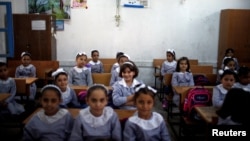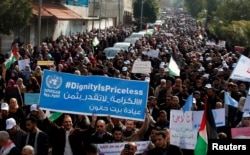The chief of the United Nations agency that helps Palestinian refugees is promising continued aid for Palestinians, even as the United States says it is ending its financial contribution to the agency.
In the letter late Saturday, Pierre Krahenbuhl, commissioner-general of the U.N. Relief and Works Agency, said the U.S. decision "will only strengthen our resolve." He said, "The funding decision of an individual member state - albeit our historically most generous and consistent donor - will not modify or impact the energy and passion with which we approach our role and responsibility towards Palestine refugees."
But on Sunday, Israel's ambassador to the United Nations, Danny Danon, said his country welcomed the end to U.S. funding, saying the relief agency "has proven itself an impediment to resolving the conflict by keeping the Palestinians in perpetual refugee status. The Palestinian attempt to approach the U.N. is another empty statement. It’s about time that the Palestinian leadership abandoned its victimhood and incitement campaign, and takes concrete steps to improve the Palestinians' future.”
The Trump administration cut funding to the UNRWA Friday, calling the organization “irredeemably flawed.” U.S. State Department spokeswoman Heather Nauert said the U.N. agency’s “endlessly and exponentially expanding community of entitled beneficiaries is simply unsustainable and has been in crisis mode for many years.”
Krahenbuhl said in his letter, “The responsibility for the protracted nature of the Palestine refugee-hood, the growing number of refugees and the growth in needs, lies squarely with the parties and in the international community’s lack of will or utter inability to bring about a negotiated and peaceful resolution of the conflict between Israel and Palestine. The attempt to make UNRWA somehow responsible for perpetuating the crisis is disingenuous at best.”
UNRWA provides health care, education and social services to Palestinians in the West Bank, Gaza Strip, Jordan, Syria and Lebanon. The agency provides services to more than 5 million Palestinian refugees, most of whom are descendants of Palestinians who fled or were forced from their homes during the war that led to Israel’s establishment in 1948.
The U.S. supplied nearly 30 percent of the total budget of UNRWA and donated $355 million to the agency in 2016. However, in January, the Trump administration withheld millions of dollars, releasing only $60 million in funds to the agency.
Krahenbuhl said that represented a $300 million reduction in income, “which confronted our organization with an existential crisis. At no time over the past eight months were we notified of the specific reasons for the dramatic cut. It appeared clearly related however to the tensions between the United States and the Palestinian leadership following the U.S. announcement on Jerusalem and not to UNRWA’s performance. It therefore represented an evident politicization of humanitarian aid.”
The UNRWA chief also acknowledged “with deep appreciation the over 25 countries that advanced their expected annual contributions to earlier in the year to help us sustain operations” and his “immense gratitude to the 30 donors who have provided additional contributions to UNRWA’s core and emergency activities this year and those who have signed new multiyear agreements with us.”
He said, however, the agency is “still in critical need of over $200 [million] to survive this year’s crisis.”
Nabil Abu Rudeneh, a spokesman for Palestinian President Mahmoud Abbas, said the U.S. decision to end decades of UNRWA funding “does not serve peace but rather strengthens terrorism in the region.”
UNRWA is seen by Palestinians and most of the international community as providing a valuable safety net. The U.N. agency, however, is seen very differently by Israel.
Israeli Prime Minister Benjamin Netanyahu has said UNRWA promotes the unrealistic Palestinian demand that refugees have the “right of return” to long-lost homes in what is now Israel. He has said UNRWA should be abolished and its responsibilities taken over by the main U.N. refugee agency.
“There is sadly nothing unique in the protracted nature of the Palestine refugee crisis. ... Enshrined in the principle of humanity and the international law norm of family unity is the commitment to continue serving communities affected by war until a political solution has been found,” Krahenbuhl said in his open letter. “It is the failure to end conflicts that prolongs refugee situations and denies refugees the choice to define a dignified future of their own.”







